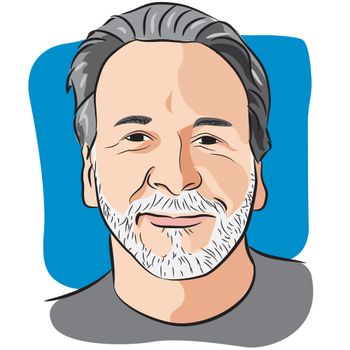
Fifteen years after my own cancer journey, I find myself balancing hope and grief as I support a colleague newly diagnosed with cancer.

Mike Verano is a licensed professional counselor, licensed marriage and family therapist and thymic cancer survivor with over 30 years experience in the mental health field. Mike has had articles published in national and international magazines and is the author of The Zen of Cancer: A Mindful Journey From Illness to Wellness. In addition, he maintains the blog, Confessions of a Pacifist in the War on Cancer. He and his wife, Kathy, live in Lanexa, Virginia.

Fifteen years after my own cancer journey, I find myself balancing hope and grief as I support a colleague newly diagnosed with cancer.

Ten years ago, as I was approaching my first follow-up scan, I asked a seasoned cancer survivor if the anxiety of going through these rituals ever got easier. Without hesitation, she smiled and said "no."

Purpose directs the energy outward, and when tied to a beneficent cause, the experience is that of being connected to a deeper source— worry for self becomes compassion for others.

It would be unrealistic to suggest that one is ever completely free of the shadow of cancer – after all, shadows are the direct result of light.

I often joke in training classes on aging that with every new candle on my birthday cake, a new medicine bottle shows up in my cabinet.

As people who have "been there, done that," our very presence provides a new arrival on the cancer rollercoaster a sense of stability and certainty.

Waiting to hear if one’s blood is showing any signs of the monster’s return has never been easy.

Cancer has taught me to be stoic when necessary, needy when appropriate and mindful at all times that the physical body is both fragile and resilient.

As any cancer survivor is aware, the blossom of hope can be a fragile flower.

It appears that we survivors have, at long last, been taken seriously about our reports of problems with mental functioning as a result of chemotherapy.

When I think of living in cancer's shadow, my mind immediately jumps to the dark body that is my constant companion and seems to, paradoxically, grow stronger the brighter the light.

I guess I’m old school when it comes to a cancer diagnosis. I have always assumed there are three types of cancer—the good (which is a diagnosis of “no cancer”), the bad and the ugly.

That cancer strikes at the very fabric of one’s understanding of why things happen the way they do is what makes this illness so insidious.

Once the unwanted growth of one’s cancer is addressed, how does one prepare the psychological inner terrain to receive the healing nurturance that carries one from illness to wellness?

The Pulitzer Prize-winning author, Siddhartha Mukherjee, refers to cancer as the "emperor of all maladies."

When I unexpectedly joined the cancer program, just before my 50th birthday, I was sure I had the “right stuff” to meet the challenge.

I actively encourage all my clients experiencing life-altering stressors to trick the mind using the art of reframing.

Since being diagnosed with thymic cancer late in 2009, I have written articles, a book and blogged about the cancer experience mostly as a therapeutic exercise — a way to cast the demon outside of myself — and as an offering to others survivors.

One of the methods my wife and I developed to ward of the cynicism that comes when faced with such an unrelenting foe is something we call "playing the cancer card."

Whoever said there's no way to make time stand still clearly never had to endure the excruciating wait for scan results.

One often hears cancer survivors proclaim with pride, honor and dignity, “I never asked why this happened to me.” Unintentionally, this sets the standard for those who follow, creating the unwritten rule that asking why is to admit weakness, to be unfit for battle.

If we're going to head into the deep waters of the meaning of life after a cancer diagnosis, why not strap on the laughing gas along with the oxygen tank?

If it’s true that cancer can pull the rug out from underneath the most sane and rational among us, why is not also true that we respond with the psychological equivalent of CPR, or, at the very least, an emotional Heimlich maneuver?

There are many ways that survivors are encouraged, prodded and cajoled toward the idea that in order to fully recover from cancer we need leave the role of cancer patient behind.

Unpredictability is par for the course when it comes to a cancer diagnosis. However, I have found a strange comfort in a very reliable pattern when it comes to preparing for follow-up visits.

Coming face-to-face with a cancer diagnosis not only shakes the very ground beneath one’s feet, it sends tremors throughout the mental landscape that constitute one’s worldview.

There is a new cancer center commercial that, quite frankly, freaks me out.

I’ve found in myself, and many of the survivors I’ve met in counseling sessions, that of all the stages of grief, anger seems to have the greatest staying power.

Those of us touched by cancer know all too well that the stages of grief are not linear—not steps we move along with the precise choreography of ballet dancers.

It makes perfect sense to me now that exhaustion is one of the byproducts of cancer treatment. As blood counts drop, cells die, and the mental stress and strain builds, the vital energy force no longer flows like a raging river—it has all the power of a dripping faucet.

Published: December 1st 2016 | Updated:

Published: December 14th 2016 | Updated:

Published: February 9th 2017 | Updated:

Published: February 23rd 2017 | Updated:

Published: March 3rd 2017 | Updated:

Published: March 13th 2017 | Updated: